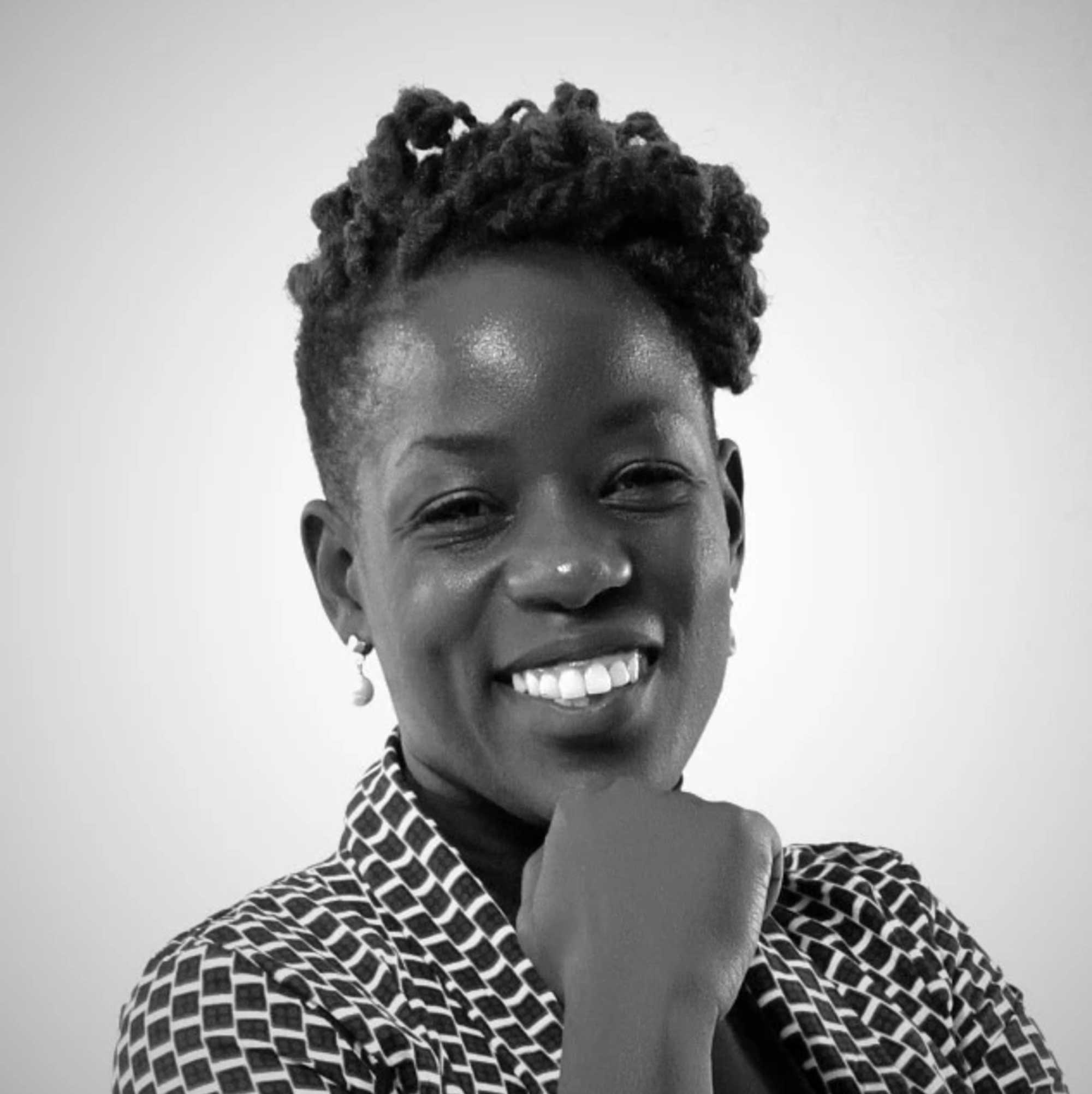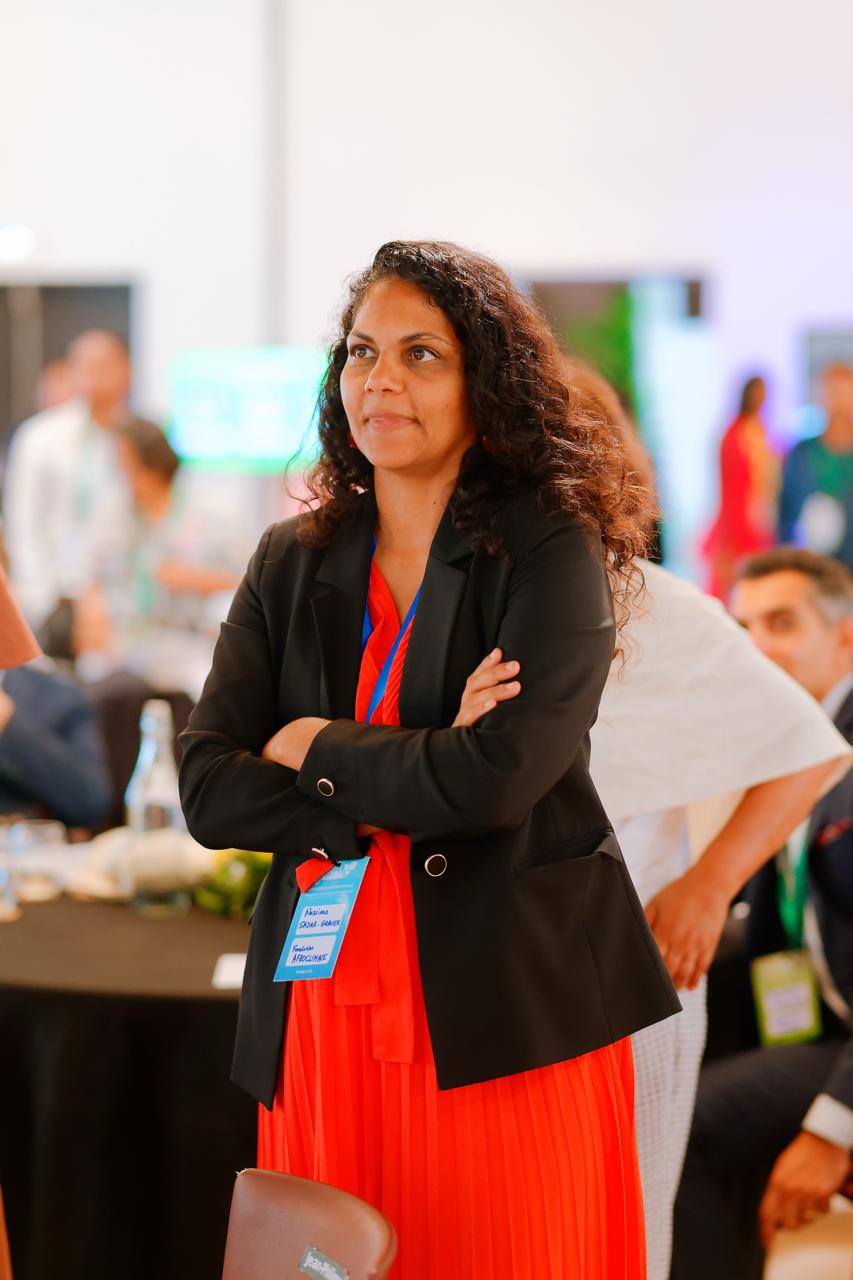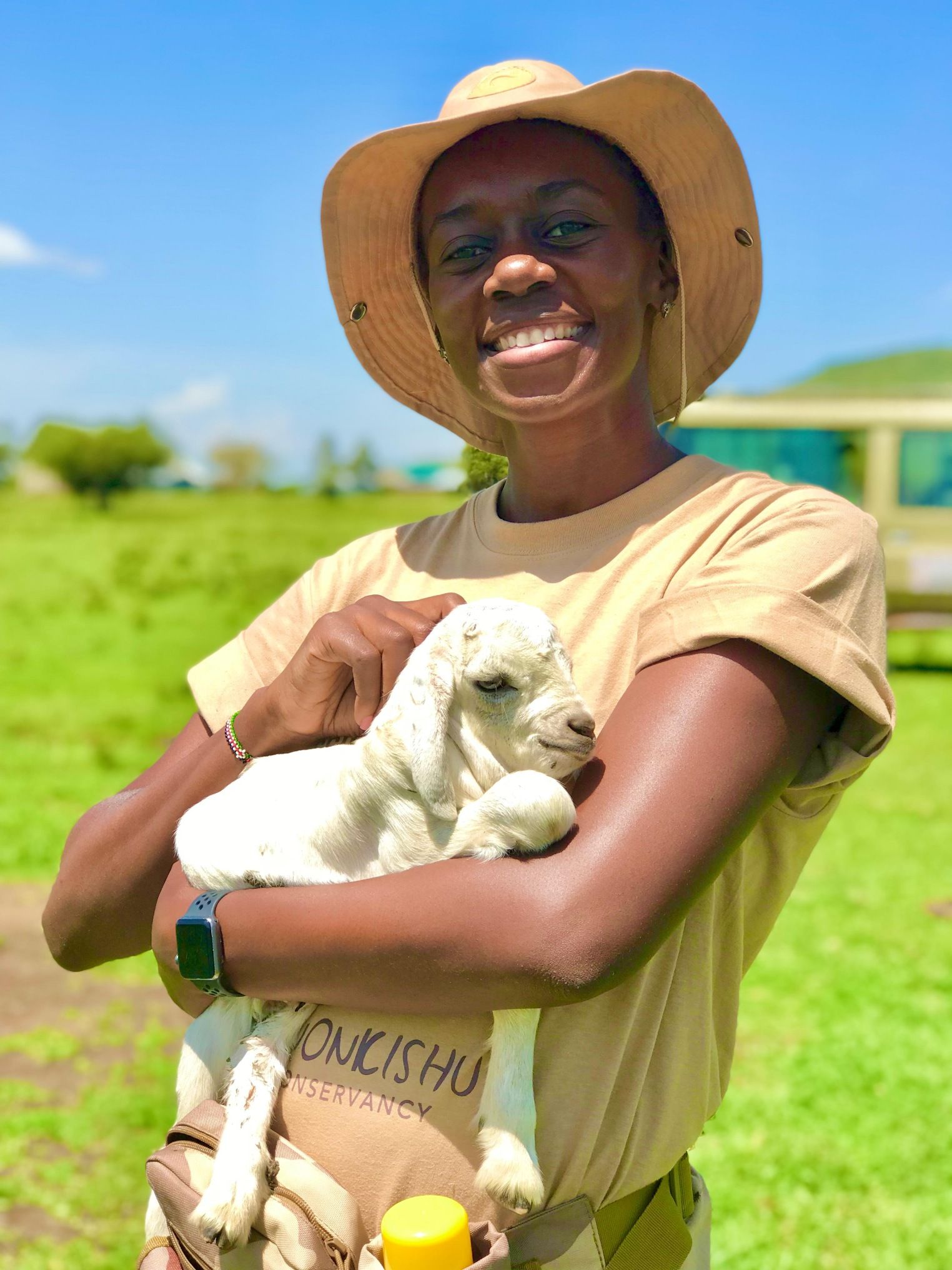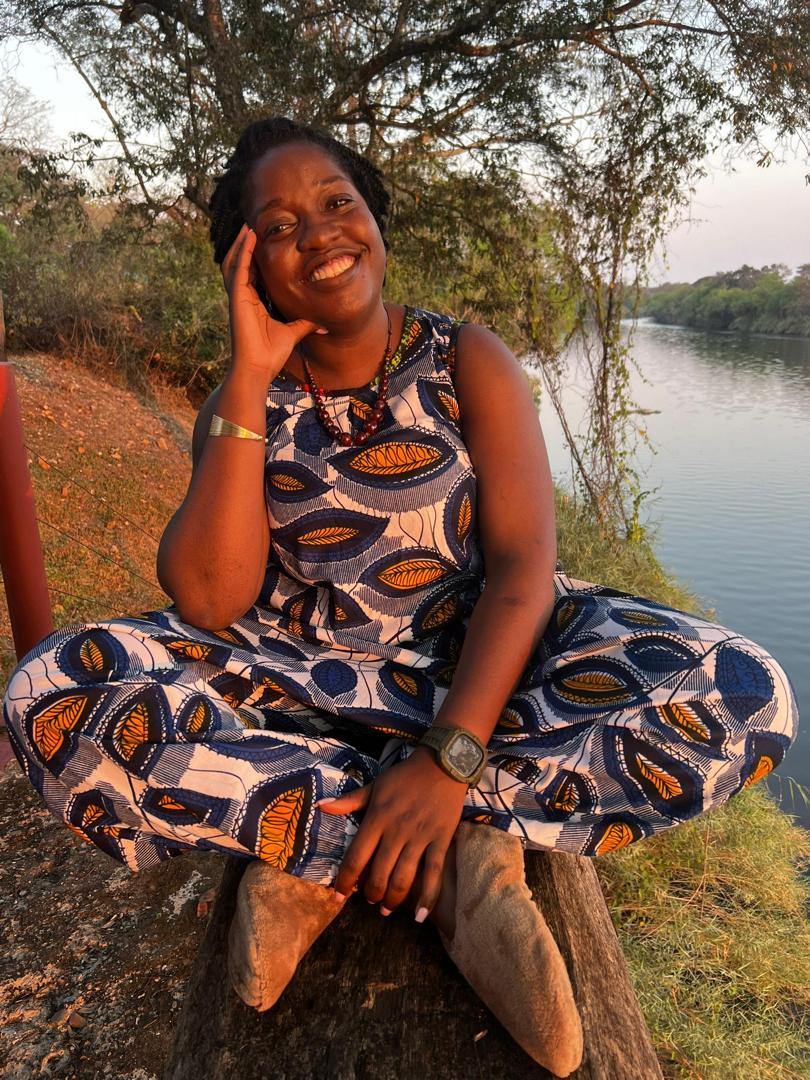I have come to understand that if an opportunity passes me by because I stood by what I believe, then it wasn’t mine in the first place

Cynthia Mumbo
Cynthia Mumbo has made it her life’s purpose to influence and grow the sports industry in Africa. After having worked in a number of blue chip companies for more than a decade, she quit formal employment to start an entrepreneurial journey that would leverage on her passion and fulfill her dreams. Her company, Sports Connect Africa, focuses on connecting and empowering sports stakeholders in Africa.
Sports Connect Africa currently manages the Junior NBA League in Kenya, runs the Africa Sports Business Mixer, a networking forum for sports stakeholders and manages the Vikapu Elite Basketball Camp, a sports development camp for young people under 18. For her work, the 37-year-old State House Girls High School alumnus was recently awarded the top 30 under 40 Leaders in Sport, a prestigious global award for personalities who are shaping sports business around the world.
Cynthia has served in the Executive Committee of the Kenya Federation as a co-opted member, is the secretary-general for the Kenya Basketball Women’s Commission and serves as an advisory board member for the Hype Sports Innovation.
She talks to Damaris Agweyu about her relentless quest to actualise her dreams and empower others to do the same for themselves.
Cynthia, what motivated you to get into the business of sports?
I was motivated by the fact that I was both passionate and exceptional at sports yet it did nothing for me, I promised myself I would create opportunities for other people who may find themselves in similar circumstances. And so I made it my mission to understand why it is that sports works in Europe, America and Asia and not here in Africa. Why couldn’t I go home saying that I am earning my salary from doing what I love to do, which is sports? Why aren’t more people deriving their entertainment from sports rather than in bars? How come we don’t see more people patriotically following local sports? This bothered me and has continued to bother me for a long time. That’s why I got into this space. My son who is 11 says he’s going to be the fastest man in the world and I agree with him so I must create an avenue for him to be able to practice, hone his skills and live out his dreams.
Has it always been sports for you?
Always. I wanted to become a top athlete by the time I was five years old. When I got to high school, every university prospectus that I picked up had a sports management or sports science component. I knew that wherever life took me, sports would always be a huge part of the journey.
What is your sport?
I have two, running and basketball. I used to be a sprinter. I then discovered basketball when I was in high school and the first day I threw a ball towards the net, it went in and I knew this was it. For most of my life, I’ve always either been on a basketball court or on a running track.
Did your parents encourage you to chase your dream?
Today, they are my biggest supporters but back then no, they didn’t understand where I was going with all of it. And I don’t blame them. It’s the system. It doesn’t encourage the business of sports; even in Swahili we call sports michezo (games) and just like the word connotes, sports is viewed as something you do for fun. But I’m extremely strong-willed…like both my parents. I have consistently focused on the best of what it is that I am trying to achieve and now, they are extremely supportive.
Did you end up studying a sports-related subject in school?
I ended up going to university but didn’t finish my course…I was kicked out. And while this is not something I’m necessarily proud of, it’s something I would want other people to know because it’s about getting back up on your feet and finding yourself again, even when you think you’ve failed. I chose that to be one of my greatest learning experiences because that was when I realised the importance of having an education- you can’t pretend that you’ll just get there. School is different for different people, it doesn’t mean that it has to be a degree but you have to acquire knowledge. You can’t run away from that. And so I purposed to continuously learn new things, every day.
Now here is the backstory: I’d heard the UN had jobs and was asking for people to send CVs. I sent mine and they called me back. The day I was to report, I showed up in my best dress suit…I was given a slasher and told to slash. I had been told I would work in the library so you can imagine my shock. Still, I did the job. My mum doesn’t know this, and she’ll die of laughter when she reads it. I held that job for six hours then it started to rain. God didn’t want me in that job (laughs).
I got back home and started asking myself a ton of questions about what I wanted to do with my life. I knew that whatever it would be, it would need to involve getting an education. I enrolled at Kenyatta University for a diploma in business management then I got a scholarship from Supersport to study sports business. I went on to study at the FIBA academy which is the basketball equivalent of FIFA and I have a certificate in managing federations which basically is hardcore sports management. I am also a fellow of Babson College where I did a course on entrepreneurship. And save for the entrepreneurship course which is not about grading, in all of those courses, I was top of the class. I’ve put on hold my masters in sports management.
You’ve done some time in the corporate world, how did you end up there?
At some point, I was offered an internship at what is now Sameer Africa, it used to be called Firestone back then. For the first year, I wasn’t earning anything so I looked around and thought, this is a place with thousands of factory guys coming and going on any given day; what can I do to meet their needs and get some money? The answer was simple. I started waking up at 4 am every day to make chapatis and sell them at work. By 10.30 am I’d have sold everything. My chapatis became so famous that the corporate staff started buying them as well. That was when I realised I could actually do business.
After my first year, I got absorbed into the system and worked at Sameer for another five years in sales. During this time, my friend Stella Opondo and I set up a company basketball team. Within the first year, we’d made it to the playoffs. But I came to realise there were so many issues in basketball at the National level. There was consistent infighting at the Federation. And since I’m the kind of person that looks at situations and focuses on solutions rather than the problems, I came up with solutions to manage some of the problems. The Federation was so impressed that they asked me to join them to lead the marketing side of things. Meanwhile, career-wise, I was transitioning from Sameer to EABL where I would work for the next three years. All this time, I remained a member of the Basketball Federation and kept seeing the problems athletes have to endure. I realised that more than anything else, the people in the sporting world needed to be empowered. That was when I enrolled for a course within the FIBA Academy and later became the FIBA manager.
So now here I was, with a background as an athlete, who now understood the Federation and had worked in the corporate sector. I decided to put my diverse knowledge to good use and registered Sports Connect Africa in 2012. But like most new entrepreneurs, I was dilly-dallying, dipping in and out of employment for fear of losing my steady income. I was out on my own for a year and realised when it came to business, there was nothing I knew. When you are working for someone else, so much is covered and you are only concentrating on one thing. I had zero understanding about managing people, I had no idea how systems worked, I thought finance and accounting were one and the same. There was a year we were looking for sponsors as the Basketball Federation and I approached Menengai Oil Refineries to sponsor us. The MD said he’d give sponsorship on condition that I worked for the company in marketing- I took up the offer. So, essentially, I was back in employment.
While at Menengai, I helped get the men’s national basketball team to go to South Africa- this was a huge deal. It was during this trip to South Africa that I was introduced to the NBA. I’d always dreamt of doing something with them so when I was invited to their offices, I could hardly believe it. I kept pinching myself to confirm this was actually happening. We held discussions based on my passion for basketball and the vision I had for Sports Connect Africa and they showed interest in working with me.
At what point did you finally make the full transition from corporate to entrepreneurship?
In 2016; four years after registering my company. One day I just woke up and told myself, “you know what, you either do this or you do this”.
Did all the jobs you did prior to starting your company matter?
Every single one.
How is the entrepreneurial journey going for you so far?
Entrepreneurship is not a joke. I don’t want to lie to anyone that I have made it – I have not. I’m seeing a turning point somewhere in the near future but I am not going to lie that I am a millionaire – I’m not. We’re still at a place where we are pretty much positioning ourselves and this takes time. We are still building and are very proud of what it is we are trying to achieve.
And what is it that you are trying to achieve?
There is a gap in the commercial discussion about sports which, as Sports Connect Africa, we want to fill. Yes, sports is social but there is a huge element that is business-oriented, and that is what we fail to tap into on this continent. How many of our Rugby players are professional players? Not many, if any. In basketball, there is no one. In football, we are 50-50 and then we have people fighting all the time; there is a lack of professionalism.
With Sports Connect Africa, we want to change lives through sports and sports business. You can’t run away from the money discussion. I don’t know why we are afraid of money. We just want to do sports the right way and get people compensated properly and make money while we’re doing it- just like any other business but making sure that every stakeholder receives their fair share of which there is plenty to go round.

Cynthia Mumbo (far right) with members of the Vikapu Elite Basketball team
In this country, the business of sports is bit murky
Because it’s new. The funny thing is we are known as a sports nation but are we?
Are we?
Well, we are and we aren’t; we are extremely talented, that’s for sure. Every sport we touch turns to gold but the problem is, while the rest of the world has moved beyond talent to innovation and investing, we are still stuck at the talent stage- the stage we’ve been at for the past 20, 30 years. We cannot compete in a world where everybody else is investing.
Today, countries are investing in their people, their infrastructure and their platforms. They are getting their populations buy-in and that channels a lot of energy into the outcomes. In this country and continent as a whole, we are still talking about administrators who think they are bigger than the sportsmen, we have people stealing from athletes for crying out loud! The unwritten law of sports states that the athlete is the core, the star; this is the person you invest in. As long as we don’t understand this law, sports is not going to work for us.
There are foreigners who come here to live in Iten just so they can immerse themselves in that environment and learn. We are lucky to have what we have but can you imagine if we invested just a little bit more into this talented person and really empowered him or her by creating an enabling environment for them to succeed?
So you have a gift but what do you do with your gift? Do you just sit there and say I’m gifted and yet everybody is working to beat you at your gift? And you can see now, they are beating us. Probably not in athletics yet but if you look at other sports, they are surely beating us. We were once the greatest in hockey- the men’s team was absolutely amazing and played in the Olympics, the women’s team was top in Africa. Our basketball team was top in Africa. The rest of Africa was benchmarking itself on us. At that time, we should have been benchmarking with global giants and maintaining those standards but we didn’t. And now we have other African teams beating us.
Are these the reasons why some of our sportsmen and women are jumping ship and taking on other nationalities?
Yes, they have decided to go where sports works better for them. And though many hold those other nationalities, they are still happier to live here.
Where do you see this business going?
We want to become the vehicle that connects Africa and the rest of the world in terms of sports and sports business.
Which do you think is more important? Chasing the passion or chasing the money?
If I was chasing the money I don’t think I’d be doing what I’m doing. I want the money but I have to build on this thing I’m passionate about first. If it was about money, I believe I’m good enough to work anywhere and earn whatever. We’ll make the money, its business, you have to make money and there is nothing wrong with that but I’m passionate first. Otherwise, I can leave this passion and get back into corporate where I worked for like 12 years. But then again, I’ve been fired more times than I can count.
Because of your passion?
Yes. Not necessarily being passionate for sports but being passionate as a human being.
People take my strong-willed nature as being overly aggressive. I don’t believe in being hired and being told what to do. I believe in being hired and being told what the outcome should be and being allowed to deliver that outcome. At our office, we are a team of four, sometimes more depending on the project; as long as you have your laptop, you get stuff done. We know that by this day this has to happen, so we just get on with it. I’m not going to ask you, “where are you?” I am working with young, free-spirited guys, I believe they are amazing and I believe they can deliver.
What advice would you give to older generations of managers who are working with young people in today’s world?
One, young people also want really good stuff; do not assume that they don’t. Two, they are very hardworking; they just don’t work in the time structures that we are used to. They were born with gadgets and have reduced time or increased time, depending on how you look at it. At our office, we are all literally working on WhatsApp on a daily. The point is you need to understand young people. And while we should all understand and respect the rules, we should also understand this: offices are just walls and doors. Allow these young people to deliver their best and let them know that you trust them to do so.
What were you completely certain about till you found out you were wrong?
I was sure that by the age of 26, I would have had a wedding and two kids. It didn’t work out that way, it used to worry me but not anymore. I have my son and he’s enough. Life has its way of balancing things out. I have no regrets. I choose, in this moment, to be happy because I only have power over this moment- nothing else.
What is your greatest achievement to date?
I am the first African woman to have received the Global Leader in Sports Business Award. This is one of the most prestigious awards in sports business in the world. Being awarded alongside the top leaders in NBA, Formula 1, English premier league…being on the same platform with people like Arsene Wenger and you’ve only just begun is a humbling experience. It made me feel like what my team and I are doing; all the hard work we’ve been putting in hasn’t gone to waste. My son keeps telling me, “mama you can be anything you want to be in the world”, and he’s right.
What’s the most impactful book you read?
Shoe Dog, by Phil Knight…He’s the co-founder of Nike, it’s so real. His spirit of ‘I believe’ is so powerful, I’ve never encountered anything like it.
Speaking of Nike, their latest advert with Serena Williams is quite something eh?
After watching it, I cried- many times. The funny thing is we just had a team meeting the other day and the team started saying, “you know Cynthia that ad is just you, people are always telling you you’re crazy”. And it’s true. It was just so close to my heart because for as long as I can remember I have always been told that. Even when people read this, some will be thinking, that chic is so into herself- because that’s what we are told as women…when you speak your mind and go for what you want, you are so into yourself but when a guy does it, it’s awesome, he’s a man. With a woman, people are like, “kwani wewe ni ndume?” (Is it that you are a bull?) It’s actually a question I’ve been asked and I wonder, what does that even mean? What’s wrong with being strong? I’ve made my mistakes but so has Oprah Winfrey, so has Wangari Maathai, so has Michelle Obama. I’m so inspired by these women, they are incredible.
What will it take for things to change?
The change is coming, for sure. And women today have more opportunities today than ever before so we can’t take that away. It’s just that now we need to start moving to that table and saying I want my seat. Personally, I’m like, “I’m coming with my own damn seat and I will sit down with you…I’ll even create my own table in that room and I’ll sit there if that’s what it takes“. It’s a journey and I just hope I can influence others to believe they can be who they want to be, no matter who says what.
What is your definition of success?
Number one, creating a positive impact. When I get feedback on how we have helped others, this is success. Number two, we are a business so financial health is also success; we have to create and meet targets. But for me, there has to be a balance between the two. We’ll make money but then impact in terms of solving problems, empowering others and being able to quantify outcomes are all very important.
For more wisdom and insights from Cynthia Mumbo, get your copy of Different Paths, One Journey HERE.





